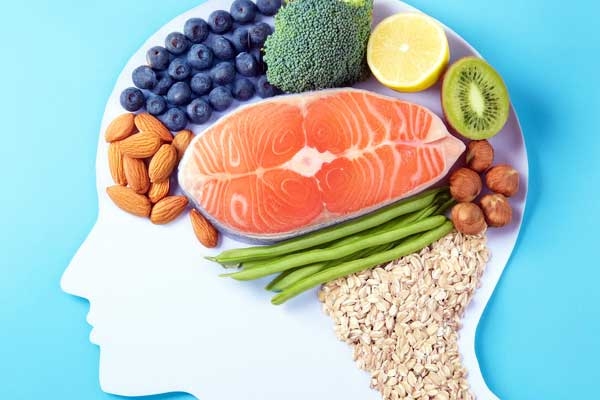
(Image source from: Canva.com)
Have you ever entered a space and momentarily forgotten your purpose or had difficulty recalling an important detail from a discussion? Although these instances of forgetfulness may appear trivial, they are often connected to the nutrients we include in our diets. Our brains function like precisely calibrated engines, necessitating the right nutrients to remain sharp, process information efficiently, and sustain long-term cognitive vitality. Inadequate nutrition can lead to reduced mental clarity, diminished focus, and an increase in memory-related issues. Studies indicate that specific nutrients are essential for enhancing brain functionality, improving memory, and lessening the risk of cognitive diseases like Alzheimer's. These vital substances bolster mental acuity, strengthen connections between neurons, and offer protective benefits against cognitive deterioration. Below are three essential nutrients for brain enhancement, along with their recommended dosages and the best food sources to add to your diet to achieve optimal mental performance.
Omega-3 fatty acids: These essential nutrients are crucial for maintaining brain health, supporting cardiovascular function, and promoting overall wellness. As the body cannot synthesize omega-3s on its own, they must be acquired through dietary sources or supplements. The three main forms—EPA, DHA, and ALA—are known for their roles in enhancing memory, reducing inflammation, and lowering the likelihood of heart-related ailments. Notably, DHA is a significant component of brain tissue, necessary for the formation of brain cells and for facilitating effective communication among neurons. Found in foods like fatty fish, walnuts, flaxseeds, and fish oil supplements, these beneficial fats also help mitigate inflammation linked to cognitive decline and memory issues. A study conducted in 2022 highlighted that consistent intake of omega-3s leads to improvements in learning, memory, cognitive performance, and brain circulation, underlining their importance for mental acuity and long-term neurological health.
Recommended Daily Intake: For maintaining optimal brain function, specialists advise a daily intake of 250 to 500 mg of total EPA and DHA. However, individuals facing cognitive challenges may experience advantages from higher amounts, with various studies suggesting that doses up to 1,000 mg per day can enhance cognitive performance further.
B Vitamins: The B vitamins play a vital role in cognitive health, energy generation, and brain functionality. They are integral to the proper operation of the nervous system, improve memory retention, and help alleviate mental fatigue. Specifically, vitamin B6 is critical for the synthesis of neurotransmitters, while B9, known as folate, is important for brain maturation and helps lower the chances of cognitive decline. Vitamin B12 is key in supporting nerve health and maintaining mental sharpness. These vitamins also assist in mood regulation, lessen confusion, and enhance concentration by facilitating effective communication between neurons. Furthermore, they help reduce elevated levels of homocysteine, an amino acid linked to memory deterioration and cognitive deterioration when found in high amounts. A study conducted in 2012 indicated that inadequate vitamin B12 levels correspond with slower cognitive processing and diminished memory capabilities. B vitamins can be found in various food sources such as leafy greens, eggs, dairy, whole grains, meat, and fish, making them essential for sustaining optimal mental function and brain health over time.
Daily Recommendations: Aim for a daily intake of 1.3 to 2 mg of vitamin B6, which can be sourced from foods like poultry, bananas, and potatoes. For folate (B9), a daily intake of 400 mcg is advised, with spinach, lentils, and oranges serving as good sources. You should also seek 2.4 mcg of vitamin B12 daily from options like eggs, dairy products, and fortified cereals.
Antioxidants: Antioxidants are essential compounds that protect the body from the detrimental effects of free radicals, which can damage cells and contribute to chronic illnesses, including heart disease, cancer, and Alzheimer’s disease. They bolster the immune system, promote skin vitality, and help combat the aging process. Notable antioxidants include vitamin C, prevalent in citrus fruits and bell peppers, vitamin E, abundant in nuts and seeds, beta-carotene, found in carrots and sweet potatoes, and flavonoids, which are present in berries and dark chocolate. These antioxidants are crucial for maintaining overall health. Additionally, antioxidants, particularly vitamin C, vitamin E, and flavonoids, offer protection to brain cells against oxidative damage, which can hasten aging and memory loss, while also promoting healthy blood flow to the brain, ensuring it receives essential oxygen and nutrients.
Daily Recommendations: To promote optimal well-being, it is suggested that you consume 75 to 90 mg of vitamin C daily, with increased requirements for smokers. Vitamin E should be ingested at 15 mg each day. Although there are no official recommendations for flavonoid intake, it is beneficial to include a diverse array of colorful fruits and vegetables in your diet to secure sufficient amounts.
Although omega-3 fatty acids, B vitamins, and antioxidants are critical for health, excessive consumption can lead to potential issues. An overabundance of omega-3 can result in bleeding problems or adversely affect blood coagulation. Additionally, an excessive intake of specific B vitamins, particularly B6 and B12, may cause nerve damage or toxicity. Moreover, high doses of certain antioxidants, especially vitamin E, could heighten the risk of bleeding and interfere with medications. Therefore, it is important to maintain a well-balanced intake of these nutrients to prevent adverse effects and promote good health.







